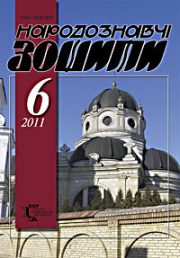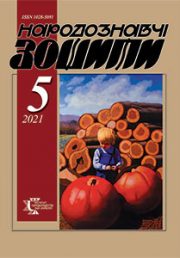The Ethnology Notebooks. 2019. # 5 (149). P. 1037–1376
DOI https://doi.org/10.15407/nz2019.05
Anniversaries
KOVAL Halyna
NEW ACHIEVEMENTS OF THE SCHOLAR (To the 65th anniversary of Vasyl Sokil)
1039—1044
Articles
SOKIL Vasyl
MY GENEALOGY
1045—1055
SOKIL Vasyl
DIFFICULT FATES OF MY FAMILY IN THE 20TH CENTURY: HISTORICAL AND FOLK DOCUMENTATION
1056—1067
SOKIL Hanna
CIENTIFIC CONTRIBUTION OF IVAN VOLOSHINSKY TO UKRAINIAN FOLKLORE STUDIES
1094—1101
HALAICHUK Volodymyr
POPULAR CALENDAR OF SLAVUTCHYNA IN RITUALS, CUSTOMS AND FOLKLORE
1134—1164
RAKHNO Kostyantyn
POTTERY THEMES IN THE FOLKLORE RECORDINGS BY MYTROFAN DYKARIV
1165—1177
YARYNCHYNA Olena
HISTORICAL AND SOCIAL BACKGROUND OF RECRUITS’ AND SOLDIERS’ SONGS
1178—1184
NABOK Maryna
ETHNOTYPE OF HEROES IN UKRAINIAN NATIONAL DUMA AND KURDISH NATIONAL SONGS
1185—1190
KOVAL Halyna
HYPERBOLIZATION IN A POETIC CALENDAR-RITUAL PICTURE OF THE WORLD
1205—1210
KACHMAR Maria
METAMORPHOSIS IN UKRAINIAN CAROLS WITH APOCRYPHAL MOTIFS
1211—1219
MAZURYNA Natallia
SYSTEM OF VARIATION IN KUPALA SONGS
1220—1227
PAVLOVA Alla
THE PROBLEM OF MORAL CHOICE AS A RESPONSIBILITY IN THE UKRAINIAN FOLKLORE
1228—1232
SOKIL-KLEPAR Nataliya
BASIC ISSUES OF MICROTOPONYMS CREATION
1233—1238
KHARCHYSHYN Olga
«HEY, SOKOLY!» («HEY, SOKOЈY!»): LYRICS AND CONTEXTS OF THE SONG
1246—1259
PASTUKH Nadiia
UKRAINIAN BRIDAL SONG ABOUT THE GREAT DREAM OF THE BRIDE: MOVING THROUGH SPACE-TIME
1260—1267
HALAICHUK Oksana
HORROR AND AMORRALITY IN «TALES OF POKUTTIA» BY OSCAR KOLBERG
1268—1273
TRUMKO Oksana
EMPATHY IN THE LINGUO-DIDACTIC ASPECT
1286—1290
Materials
SOKIL Hanna
WEDDING SONGS LADKANKAS FROM VERKHNIA ROZHANKA
1331—1341
Reviews
Yankovska Janna
Mosaic ritual of folklore
1358—1360
Mykola Dmytrenko
Panorama of life in letters
1361—1363
Kebuzynska Ksenia
Materials for the biography of Michael Zubrytsky
1364—1366
From the archive
Sokil Vasil
The original document from the time of the great famine in Ukraine
1367—1370
Stepan Pavlyuk, Eugene Paschenko
Big loss for Ukraine – went to eternity Krzysztof Vyernitskyy
1371—1373
Information







